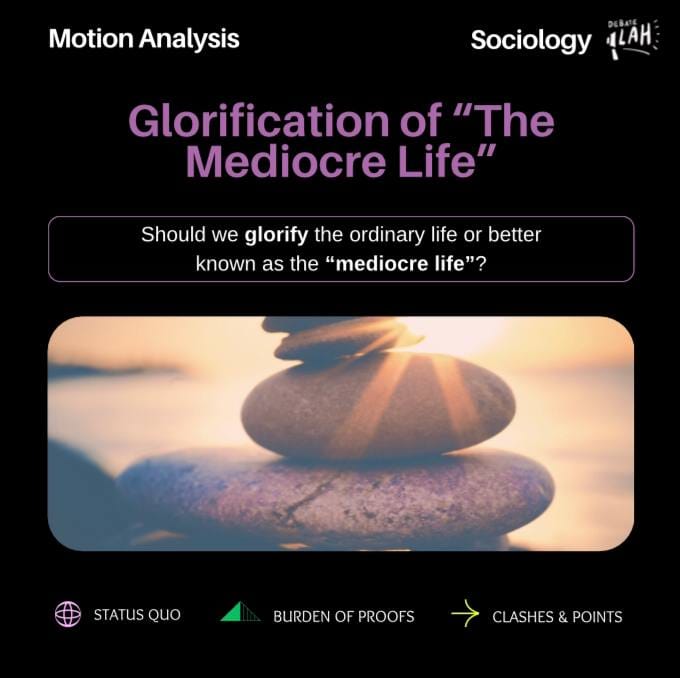The Mediocre Life
A mediocre life feels ordinary, lacking excitement, or purpose. It often involves routine, little growth, and no strong passion or goals. People may feel like they're just "getting by" rather than living fully. It's a life that may feel ordinary, unremarkable, or unsatisfying, falling short of a person's potential or expectations. However, it's important to note that this concept is subjective and varies based on individual values, ambitions, and societal influences.
The question of whether we should glorify a mediocre life is relevant because:
- Contentment vs. Ambition
Some say embracing a simple, stable life is okay if it brings peace and happiness. Others believe we should aim for more and not settle for mediocrity. - Societal Pressure
Society often pushes for success and constant improvement. Glorifying mediocrity could challenge this pressure and promote self-acceptance. - Fulfilment
The main issue is whether a mediocre life truly fulfills people, or if it leaves them feeling like they're missing out on deeper meaning or greater achievements.
The debate is about balancing contentment with striving for growth and purpose. Should we celebrate the simple life or push for more? Which narrative should we, as a society, subscribe to that benefits us the most?
With these questions unanswered, let us give you our analysis of the motion:
This house supports the glorification of "the mediocre life"
Status quo: Most are living mediocre lives, but is it a good thing?
Proponents believe that mediocre lives should be glorified. This looks like encouraging people to explore the virtues of an ordinary life, like spending more time with their families. This also looks like supporting media that focuses on experiences accessible to the average person rather than the experiences of high-achievers or the wealthy. For example, the media may publish articles about how careerists tend to be less happy and more stressed with mental health issues because of the long hours they work. Proponents clarify that they are not glorifying a terrible life. A mediocre life means not achieving great success or failure rather than suffering and starvation.
Opponents cannot stand for the coexistence of different narratives, i.e. promoting mediocrity with differing types of success. These narratives will cease to have any effect because contradictory narratives cancel each other out. On their side, there are innumerable self-defined successes, making their narrative less persuasive, and fewer people would opt for it. People are likely to choose a narrative propagated by society or by people who are relatively more well-off in society.
Opponents want to accept the narratives that exist in the status quo. The narrative of trying hard, the narrative of valuing achieving success, and the narrative that success is not blindly chasing after money but rather experiences and friends gained along the way, are all examples of narratives of success and happiness that already exist. On the government side, there are differing definitions of mediocrity, often dependent on one's environment. The narrative from proposition is an active act of shaming, and a narrative where people who pursue and achieve success lead meaningless lives. The narrative in the status quo is successful people are seen as elites who are different from the average Joe. Opponents believe that it is unjust to shame those who work hard and to criticise those who contribute the most to society. They believe proponents discourage the future success and productivity of individuals, further disincentivising them from pursuing success when it is already hard to achieve in the first place.
#1 Happiness: Should we find it in simplicity or excellence?
Proponents argue that glorifying a mediocre life will make people significantly happier. On both sides, people will lead mediocre lives because most people don't achieve success given that it relies on arbitrary factors like luck. Besides that, success requires specific skills that most people can't achieve through hard work but have to be born innately with them. Lastly, people may face challenges when striving for success.
Additionally, success is not defined by subjective metrics but based on exclusivity. Society on the opposition side will make it seem elusive to achieve success, oftentimes portraying success as something only achievable by a small minority. Besides that, success is often a relational measure of individuals against other individuals in their proximity. For example, in Singapore and Hong Kong, their middle classes are extremely wealthy by historical standards, but many would remain discontent as they are not as good as the wealthy in their countries who are profoundly successful. Proponents believe that people are much happier and content with mediocre lives when they no longer have to meet unrealistic expectations.
Opponents say that their society is best when people make big decisions that involve large risks and efforts. People are likely to venture into entrepreneurship and achieve breakthroughs in fields like medicine. Comparatively, people on the proposition side are less likely to want to pursue their dreams and take on risks. Opponents say that even if people may fail to achieve immense success, they will still feel more content with the handful of achievements they may gain.
Opponents also argue that on the proposition side, people are pressured into thinking that they have to be mediocre in everything and that success wouldn't matter much to society since mediocrity is glorified. Failure to achieve things the average person has or straying away from societal norms means facing backlash and discrimination. For instance, a person is likely to get laughed at should they not start their own family or get a job. Opponents say that their side is happier as people are allowed to strive for excellence, and even if they may not achieve success, success is not contingent on the outcome of a pursuit. The experience and process of a pursuit matters, and some may even acknowledge the gain of knowledge as something valuable and as success.
#2 Which side better benefits minorities?
Proponents state that they would engage in the narrative of slowness and mediocrity. Pre-colonial lifestyles are no longer disparaged because they are seen as non-western. Without capitalism and its unending pursuit of success, minorities are no longer seen as innately reproachful simply because they act in different ways than others. Crucially, with how deep the narrative of mediocrity is, opponents at least get rid of the most insidious form of oppression for minorities today. Their side is likely to guarantee more basic rights for people. On the opposition side, in the status quo, notions of mediocrity are used to characterise minorities. For example, immigrants are depicted as slow and lazy, and indigenous Americans think they live lives of nothingness. This is used to deny them basic rights as they're thought of as mediocre. With this, minorities on the opposition side are more harmed. There may be attempts to succeed but they repeatedly fail for many structural reasons and they may become underprivileged in society. If the opposition pushes them to succeed, they will fail, and become disillusioned with the system. This actively harms them as they don't want to glorify the mediocrity they're consigned to. On the opposition side, minorities compete with each other to rise or between individuals to become productive. Competition exists and generates unhappiness.
Opponents claim that the proposition further entrenches existing inequalities. This is because in many cases, narratives will affect different groups of people differently, especially minority groups. On the proposition side, at a young age, minorities have been told that they’re born for a life of mediocrity, bound to repeat the same jobs, and can never elevate their class. Many cases of oppression aren't matters of having food on the table, but internalised oppression – to accept the fact they must be content in this scenario when they do not deserve to be. This does not affect everyone equally as mediocrity is not viewed the same across the board for all. We should not actively encourage this as this further worsens the metric of mediocrity. On the proposition side, they trap the most vulnerable in a cycle of failure, incentivizing the most privileged to perpetuate their lifestyle, and failing those we owe the most obligation towards.
#3 Greed or achievement?
Proponents say that the glorification of the mediocre life reduces greed. Greed is the primary driver of inequality. Policies that promote the accumulation of wealth and social inequalities for the benefit of a small minority only happen because people in these groups think more successful lives are better. Proponents promote the narrative that a successful life is not necessarily good and a mediocre life is sometimes better. Privileged people no longer have the incentive to pursue greater success, consigning greater wealth for themselves, and are probably incentivised to give those things up. They are more likely to default to incentives like innate notions of fairness. By raising the average of a mediocre life for everyone in society, we can continue to glorify the mediocre life while helping these individuals.
Opponents tell us that there is a subjective standard of happiness. People have different values and find happiness in different things in life. Not everyone is the same. Mediocrity espouses a general specific life where you are generally okay in everything. They are likely to criticise people who focus on their careers. OPP believes people who naturally want to focus on their careers or vice versa should be fine and should be allowed to pursue those. On the proposition side, people are pressured into thinking they have to be mediocre in everything. People will live a mediocre life until they’re old and realise they’re not truly happy, not pursuing what they want, and ending up with a midlife crisis.
Burden of Proofs
After understanding potential argumentation points from both ends, it’s your turn to evaluate whether each side has provided sufficient proof and analysis to support their stance.
Proponents should prove why glorifying a mediocre life is justifiable in opposition to the status quo where everyone strives for self-actualisation.
Opponents should prove that just because mediocrity is the norm, doesn't mean it should be glorified.
Should we support the glorification of a mediocre life? Is dwelling in simplicity as the average Joe more fulfilling? Or should we all strive to be the best versions of ourselves?
So much to unpack!
Here's a document that summarises all you need to know about both sides' argumentations regarding the glorification of a mediocre life.
Here's some additional resources to help you understand this motion better!

Lastly, thank you to Team Singapore and Team Hong Kong for the debate!
Pre-WSDC 2021 Grand Final (Singapore vs Hong Kong)
Author: Sarah (@srhdzl on Instagram)


